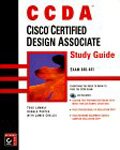|
From CertCities.com
|
|||||||||||||||||||||||||||||||||||||||||||||||||||||||||||||||||||||||||||||||||||||||||||||||||||||
|
Exam Review For CCNAs only! by Thom Jorgensen 4/6/2001 --
This book covers specific DCN exam objectives and is laid out logically with each chapter building on the one before. It may seem like a strange thing to say about a book, but I really liked the length of the chapters -- perfect for sitting down and read in one study session. In a couple of hours you can pick up the book, read one chapter, do the practice questions, and then go back and review your weak areas. Unlike some study guides that only have review questions at the end of the chapter, this book also provides case studies. Nothing paid off more on test day than the time I spent on these. They give you a scenario of a company’s current network and their goal. Your job is to have enough understanding to decide what needs to be done to get them from where they are to where they want to be. Case studies give you a real world perspective of how important each chapter is. While the review questions and practice tests are good, these case studies are the crown jewels of this book. Before I decided to buy this book I did quite a bit of research on discussion boards and Web sites. The same complaint came up a few times: Some of the information in this CCDA study guide appeared to be recycled material from Sybex's "CCNA Study Guide." I found this to be true, even though the CCDA book warns that it is for CCNAs only. I am a even more confused as to why the text goes into detail about the seven layer OSI model, network topologies and other simple topics that any CCNA should have down cold. I think the book could have been shorter if it really was for CCNAs only, or, with a little more content included, could have been enough to stand on its own for someone with any level of experience. Instead, the book is somewhere in the middle. I feel this book is everything it set out to be: a one-book follow-up for all the faithful Sybex/Todd Lammle readers that gives the CCNAs what they need to pass the DCN exam. While I might have omitted a few things, the authors put in enough relevant content for the average CCNA to pass the exam. Have you read this book? Let us know what you think! Rate it below or enter our Forums. Thom Jorgensen, CCNP, CCDP, FNCNE, MCSE, CCA, is a WAN Engineer for Netcom Group in Grand Rapids Michigan. When he's not building networks he can be found at the coffee shop reading a book and drinking too much Sumatra. You can reach Thom at . |
|||||||||||||||||||||||||||||||||||||||||||||||||||||||||||||||||||||||||||||||||||||||||||||||||||||
|
top Copyright 2000-2005, 101communications LLC. See our Privacy Policy. For more information, e-mail . |
|||||||||||||||||||||||||||||||||||||||||||||||||||||||||||||||||||||||||||||||||||||||||||||||||||||
